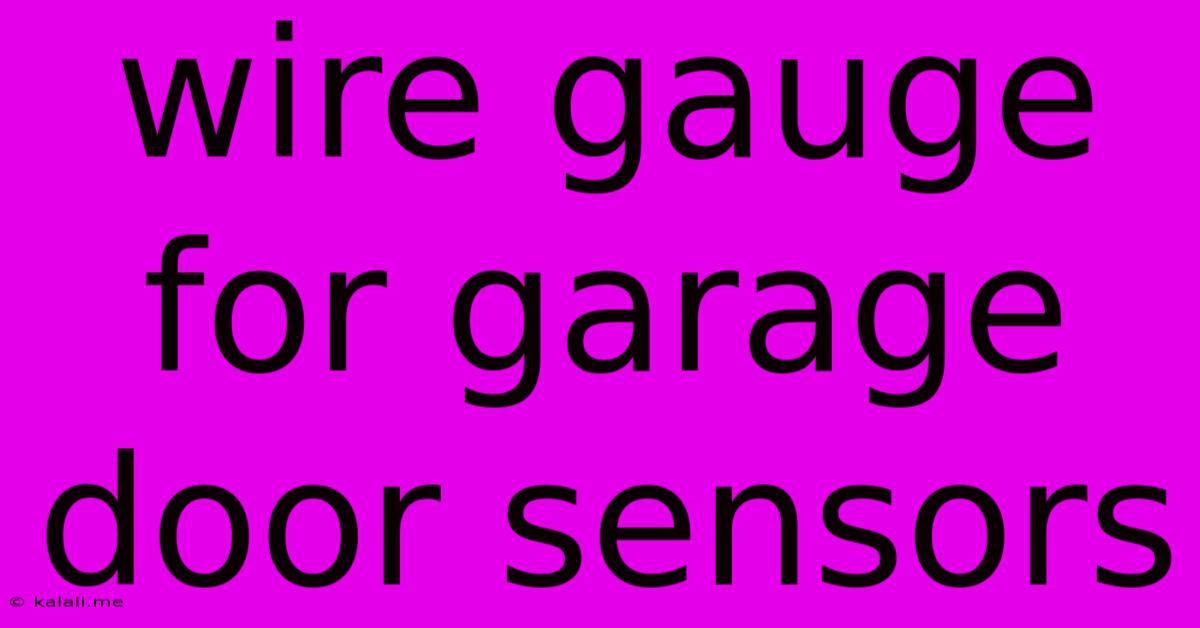Wire Gauge For Garage Door Sensors
Kalali
Jun 06, 2025 · 3 min read

Table of Contents
Choosing the Right Wire Gauge for Your Garage Door Sensors: A Comprehensive Guide
Meta Description: Learn everything you need to know about selecting the correct wire gauge for your garage door sensors. This guide covers safety, common gauges, installation tips, and troubleshooting. Avoid common mistakes and ensure a reliable connection.
Opening and closing your garage door smoothly and safely relies heavily on the reliable function of your safety sensors. These sensors use infrared beams to detect obstructions, preventing accidents. While the sensors themselves are crucial, the wire connecting them plays a vital, often overlooked role. Choosing the wrong wire gauge can lead to poor performance, unreliable operation, and even safety hazards. This guide will walk you through selecting the appropriate wire gauge for your garage door sensors.
Understanding Wire Gauge and its Importance
Wire gauge refers to the diameter of a wire. A lower gauge number indicates a thicker wire, which carries more current and offers less resistance. Using too thin a wire (higher gauge number) with your garage door sensors can lead to:
- Weak signal: A weak signal can cause the sensors to malfunction, leading to the door not stopping when an obstruction is detected.
- Voltage drop: Resistance in thinner wires can cause a significant voltage drop, preventing the sensors from functioning correctly. This is particularly problematic over longer distances.
- Overheating: High resistance in thin wires can cause them to overheat, potentially posing a fire hazard.
Conversely, using a wire that's too thick is generally not a safety concern, but it's unnecessary and can make installation more cumbersome.
Recommended Wire Gauge for Garage Door Sensors
While many DIY projects might use different gauges, the sweet spot for garage door sensors typically lies between 18 AWG and 22 AWG. These gauges offer a good balance between current carrying capacity and ease of installation.
- 18 AWG: This thicker gauge is recommended for longer runs or installations where there might be some voltage drop concerns. It's more robust and less susceptible to damage.
- 22 AWG: This thinner gauge is suitable for shorter runs and is often easier to work with in tight spaces. It's perfectly adequate for most standard garage door installations.
Important Note: Always check your garage door opener's manual for specific wire gauge recommendations. The manufacturer might specify a particular gauge for optimal performance.
Choosing the Right Wire Type
While the gauge is important, the type of wire also matters. For garage door sensors, low-voltage wiring specifically designed for indoor use is ideal. This is usually stranded wire, meaning it's composed of multiple smaller strands, making it more flexible and less prone to breakage during installation. Avoid solid core wire, which is less flexible and more difficult to work with.
Installation Tips for Optimal Performance
- Proper routing: Route the wires neatly and securely, avoiding sharp bends or kinks that can damage the wires and compromise the signal.
- Secure connections: Ensure that the wire connections are secure and well-insulated at both the sensor and the garage door opener. Use appropriate wire connectors to prevent loose connections.
- Testing: After installation, thoroughly test the sensors to verify their proper operation. The sensors should consistently detect obstacles and stop the door's movement.
Troubleshooting Sensor Issues
If your garage door sensors are malfunctioning, check the wiring first. Look for:
- Broken or damaged wires: Inspect the wires for any visible damage.
- Loose connections: Verify that all connections are secure.
- Incorrect wire gauge: If you used a significantly thinner gauge than recommended, consider replacing the wire with a thicker gauge.
Remember, safety is paramount. If you're unsure about any aspect of the installation or troubleshooting, it's always best to consult a qualified professional.
By carefully considering the wire gauge and following these guidelines, you can ensure the safe and reliable operation of your garage door sensors for years to come. Investing a little time in choosing the right wire will prevent future headaches and potential safety risks.
Latest Posts
Latest Posts
-
Explain Psalm 91 Verse By Verse
Jun 07, 2025
-
Det Ab Det A Det B Proof
Jun 07, 2025
-
I Didnt Say How Many What
Jun 07, 2025
-
What Is A Eunuchs In The Bible
Jun 07, 2025
-
Can You Substitute Oil With Butter
Jun 07, 2025
Related Post
Thank you for visiting our website which covers about Wire Gauge For Garage Door Sensors . We hope the information provided has been useful to you. Feel free to contact us if you have any questions or need further assistance. See you next time and don't miss to bookmark.